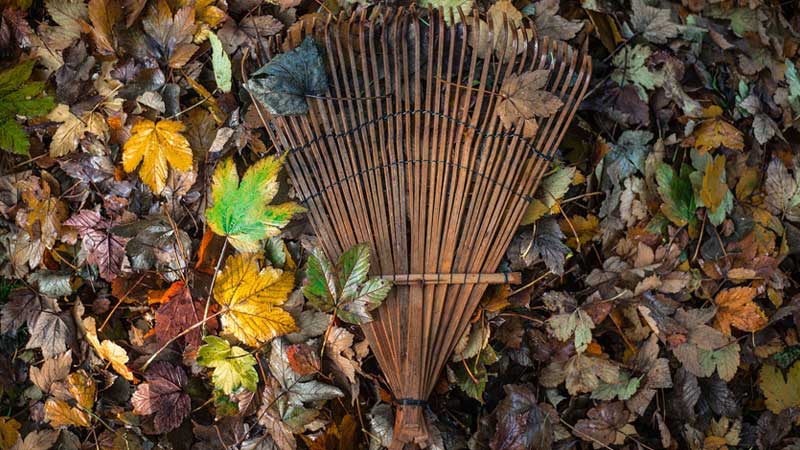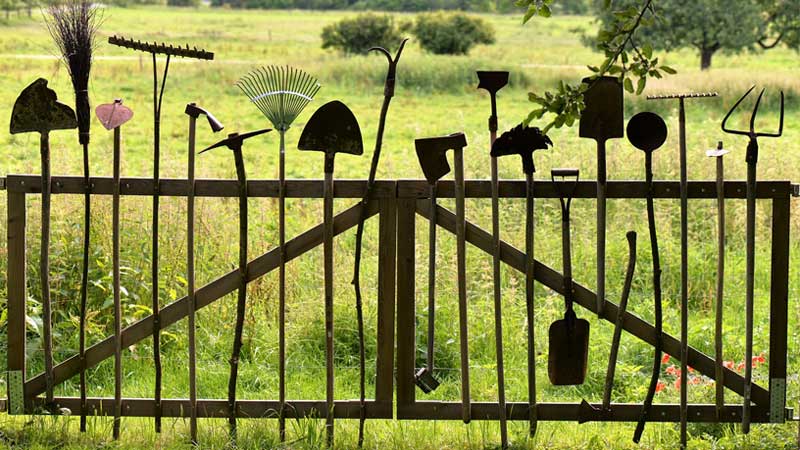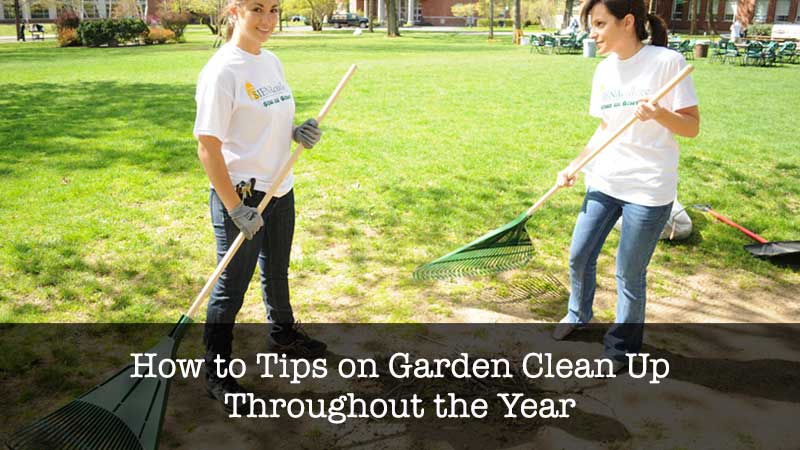Having a garden is helpful to those who enjoy growing their own food and feeling responsible for their own lifestyle. Gardens are a healthy hobby to have, as they require exercise and fresh air while certain tasks are taken care of on a daily basis. Garden clean up can even be a benefit, as it requires a certain amount of time spent outdoors.
As another plus, gardens can be a source of income to a family or simply a project that everyone can share in and share the sense of accomplishment when crops are successfully cultivated and harvested.
Table of Contents
Quick Navigation
[su_row class=””]
[su_column size=”1/2″ center=”no” class=””]
Seasonal
Other cleaning
[/su_column]
[su_column size=”1/2″ center=”no” class=””]
Tools required for cleaning
Tips
[/su_column]
[/su_row]
However, when it comes to having a garden, there is more than just planting seeds and harvesting the plants. Gardens require a considerable amount of land, rich soil to optimize growth potential for the plants you choose to cultivate and a significant amount of tools to help keep the plants cared for and the soil maintained.
Gardens require a significant amount of time dedicated to the various points in the growing process and even need attention in the off-season.
It also takes some serious cleanup efforts to maintain the garden and keep it at optimal standards for plant growth. Garden cleanup is different for each season and requires different equipment for various aspects of the process.
In order to be prepared for the various tasks that require attention, it is necessary to have an idea of what tasks need to be done at the beginning of each season.
It also is necessary to know your tools and the amount of work it takes to keep each tool ready and avoid the need to run out for a replacement when you attempt to do work for that particular season.

Seasonal:
Fall Garden Clean Up
- Remove weeds and diseased plants. Make sure to not compost diseased plants on your own home compost pile.
- Remove all overripe fruits from the ground around plants.
- Provide enough water for the fall for all plants.
- Plant new perennials, including trees and shrubs.
- Plant quick-growing greens in a vegetable garden.
- Plant grass seed.
- Divide and move peonies.
- Save tomatoes, peppers, peas and bean seeds for next year.
Winter Cleaning
- Dig up cabbage and replant head first, with the roots showing.
- Potatoes and carrots can be dug up and reburied as well, marked by a mound of straw and dirt.
- Spinach can be planted four to six weeks before the first frost. Cover with straw for a late winter or early spring harvest.
- Plant garlic, rhubarb and shallots for next year.
- Plant a cover crop, like buckwheat, to protect the top level of soil from erosion.
- Cover with a layer of compost to further protect and enrich the soil.
Spring Garden Clean Up
- Pick up all debris to promote new grass growth
- Use leaf blower as necessary
- Remove annual plants that did not survive the winter
- Trim perennials and ornamental grasses
- Clear debris, straighten and turn soil in planting beds.
- Prepare lawn work equipment for the upcoming busy season.
Other cleaning:
Fence or Boundary
- Make sure to keep fencing clean and looking attractive.
- Trim hedges or trees that create a barrier between your yard and a neighbor.
- Pressure wash wooden fencing to keep residue from cleaners off the fence.
- Use light pressure, lots of water and even strokes when pressure washing a wooden fence to avoid stripping the wood.

Garden Backyard Floor
- Gather tools, like large garbage bags, gloves, and clippers. Also, be prepared for a long haul if you have not been taking regular care of the area, so sunscreen is a must.
- Have a plan of where you want to start and what areas are next on the to-do list. This helps prevent getting overwhelmed by a huge project like cleaning a large expanse of yard.
- Make weeding a top priority. Enlist help if it seems to be too much for you to handle alone. If they aren’t dealt with, weeds can take over. Avoid this if possible.
- Remember that the important thing is to get the job accomplished, not who actually does the work. If it is too monumental a task for you, don’t hesitate to hire a landscaping company. They can typically do things quickly and efficiently for a reasonable cost.
Garden Deck

- Sweep away debris and wash down the deck first with water.
- Use cleaners. A cleaner with bleach makes the wood look brighter. Meanwhile, a cleaner without bleach is environmentally friendly yet cleans dirt and grime from the wood without damaging it or hurting nearby shrubbery.
- Apply a clear wood preservative or exterior stain. Apply with roller or brush, and be sure to brush out any puddles on the surface.
Tools that are required for cleaning:
Garden Clean Up Hand Tools

Hand tools are easy to care for and store. They can be used for a majority of the garden clean up tasks that occur on a regular basis. Still, there are some things you can do to keep these tools at their best for longer periods to avoid the cost of replacement.
1. Pitchfork/Manure Fork
- Clean and oil tines.
- Hang on wall to keep clean and organize storage space.
- Spray on penetrating oil periodically
2. Leaf Rake
- Replace handle or sand off rough edges.
- Hang on wall neatly to prevent bending of non-wooden parts.
3. Garden Hose
- Make sure hose is empty of water.
- Coil neatly.
- Check for holes and cuts in hose length.
4. Long-handled Pruner/Lopper
- Clean blades with stiff brush and dish washing liquid.
- Sharpen blades
- Spray metal parts with WD-40.
5. Wheelbarrow/Garden Cart
- Maintain handles, sanding off rough edges.
- Make sure wheel has sufficient air and is not left in one spot too long to rot.
Garden Power Tools
Power tools require more maintenance and attention to make sure they are at their optimal ability for use. Still, in some situations, like maintaining the lawn, using power tools is unavoidable.
Below are some tips for keeping these particular power tools clean and well-maintained.
1. Pressure washer
- Keep both oil and fuel filled. Change oil if necessary, per the manufacturer’s recommendations.
- Check inlet screen. Flush with water if dirty or clogged.
- Regularly check hose for leaks or cuts; also make sure couplings remain in good shape.
You can also read: The Secrets of Pressure Washer Maintenance
2. Lawn Mower
- Keep blades sharpened.
- Make sure all fuel and oil is kept full
- Regularly check air filter to avoid clogging.
- Keep fuel tank empty over the winter. Stale fuel can cause problems with starting the mower at the beginning of a new season of lawn mowing.
You can also read more details about lawn mower maintenance.
3. Leaf Blower
- Keep oil and fuel filled.
- Clean exterior surfaces.
- Make sure throttle lock and stop switch are in good repair.
- Make sure collection bag is without holes and zippers work properly.
- Keep fan blades on flywheel clean.
4. Electric Clipper/Trimmer/Shears
- Keep cord wound to prevent tangles.
- Keep edges sharp to enhance cutting performance.
Health and Safety Tips While Cleaning
- Always be aware of where your tools are to avoid accidentally stepping on them.
- Be careful of new plans, as they can pose unknown dangers if they are new to your yard.
- Be careful when working in overgrown areas, as you can be tripped by the weeds or overgrown grasses.
- Always be aware of yourself and your surroundings when working with power tools. Injuries can occur quickly if you are not paying attention.
- Working on garden cleanup means the possibility of discovering new bee hives or anthills. Either of these can be dangerous to those with allergies or simply to someone who gets stung multiple times. Be prepared and observant at all times while working outdoors.
Garden clean up can be a challenging undertaking. This is especially true since different seasons of the year require different knowledge and experience, as well as different tools. For those who wish to put in the effort, however, it is a worthwhile endeavor to create and maintain a garden.
Growing your own food and knowing what pesticides were used or the organic benefits of the food you grow can be a great self-esteem boost and also a health boost for the entire family.
Taking the time to keep tools maintained and organized makes the garden cleanup process much smoother and typically cuts off some time needed to complete such a project.
Therefore, while it is time-consuming to maintain a large inventory of tools, it is better to do the maintenance regularly than to let it all build up until it can no longer be avoided.
Finally, enjoy the fruits of your labor and the beauty of a well-maintained backyard and garden area.
These will be the envy of neighbors and also a chance to spend quality time with loved ones, working in the garden. It can be an educational pastime handed down through generations.

